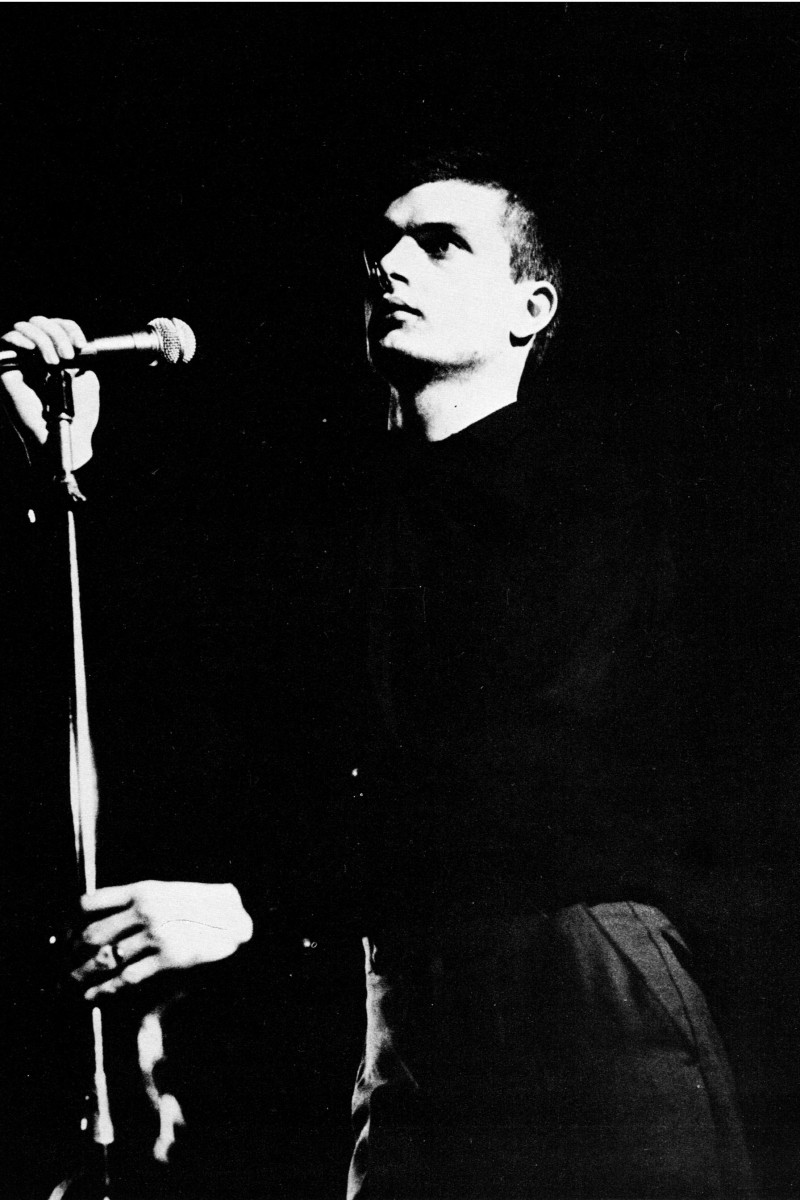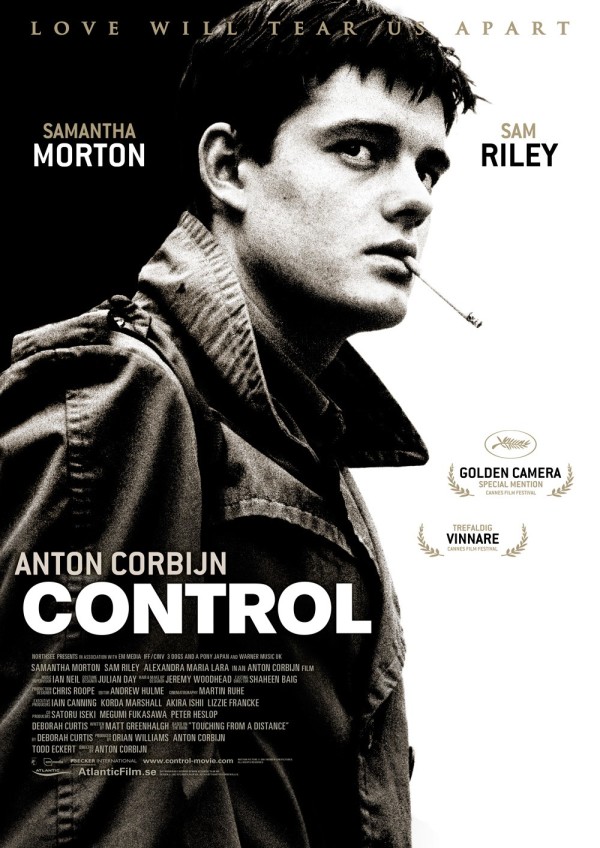CONTROL (2007, directed by Anton Corbijn, 121 minutes, U.K.)
 BY DAN BUSKIRK FILM CRITIC An ultimate music geek movie Control allows Joy Division über fan, their one-time photographer Anton Corbijn, to reconstruct the dreary world of mid-seventies Manchester for this new biopic of band singer/lyricist Ian Curtis [pictured, right]. It’s a dazzling resurrection, in overblown black & whiteCorbijn gets every detail right in his obsession to summon the stark landscape that gave birth to Joy Division desolate vision. Once we get used to Control‘s austere beauty, we find a film hung up by the same problems that have always afflicted star bios: the rise to stardom is infinitely more engaging than the sad and steady slide down.
BY DAN BUSKIRK FILM CRITIC An ultimate music geek movie Control allows Joy Division über fan, their one-time photographer Anton Corbijn, to reconstruct the dreary world of mid-seventies Manchester for this new biopic of band singer/lyricist Ian Curtis [pictured, right]. It’s a dazzling resurrection, in overblown black & whiteCorbijn gets every detail right in his obsession to summon the stark landscape that gave birth to Joy Division desolate vision. Once we get used to Control‘s austere beauty, we find a film hung up by the same problems that have always afflicted star bios: the rise to stardom is infinitely more engaging than the sad and steady slide down.
For the first hour though, the film moves along entertainingly, like a good Mojo profile. We see Curtis as a lanky and fey high school student, wearing his little sister’s tiny fake fur jacket and dancing in the mirror to Hunky Dory. We see him steal his friend’s girl and we see him occasionally stopping to scribble words in his notebook. Post-industrial Manchester is an uneventful little place and Corbijn directs the action like one of those sixties British working class dramas, the silvery sheen of cinematographer Martin Ruhe’s black & white giving the gloom a subtly romantic air.
 The actors are right in tune with Control‘s underplayed dramatics, Sam Riley (who briefly played The Fall’s Mark E. Smith in 24-Hour Party People) creates an utterly human portrait of Curtis. Much of his performance is near stone-faced – an dilemma of an actors playing the depressed – but Riley’s lean frame gives him the chance to communicate with an infinite and articulate display of slumps. It’s a slump-tastic performance, which occasionally catches fire as he’s brought on stage to recreate Curtis’ peculiar marching frontman stance.
The actors are right in tune with Control‘s underplayed dramatics, Sam Riley (who briefly played The Fall’s Mark E. Smith in 24-Hour Party People) creates an utterly human portrait of Curtis. Much of his performance is near stone-faced – an dilemma of an actors playing the depressed – but Riley’s lean frame gives him the chance to communicate with an infinite and articulate display of slumps. It’s a slump-tastic performance, which occasionally catches fire as he’s brought on stage to recreate Curtis’ peculiar marching frontman stance.
Control takes unusual care in making sure all the fetish-y little details of Curtis’ life are correct. The source they’re being so faithful to is Deborah Curtis’ Touching From A Distance, the autobiography of Ian Curtis’ widow. Left behind in the whirlwind of Joy Division’s fame, Samantha Morton frets and broods as Deborah and adds another to her many portraits of naive martyrs. Closed out of Ian’s musical life, she stayed behind to take care of the household and raise their daughter and unfortunately, much of the film seems from her perspective. Like Deborah, we spend too much time left behind; while Ian leaves abruptly to tour, we get to watch her moping as it builds into confrontation with the uncommunicative Ian. Then a montage and a classic Joy Division song on the soundtrack.
Sure, it’s Ian Curtis’ domestic squabble but after a while all domestic spats start to sound alike. Much has been made of the actors learning to play their instruments and in the few scenes that show them playing Control conjures the excitement of real people performing music. These scenes remind us that it was his musical relationships that were the root of Ian Curtis’ fame but too often the music is short-changed (their legendary producer Martin Hannett is only seen fleetingly) in order to chart the causes of his depression, which in the end are depressingly routine. A large part of what had made Joy Division’s legacy so lasting is the brevity of their career, which lasted only three years. It was a first flowering of talent and it was over before its ideas were exhausted. Control so perfectly captures the whole aesthetic appeal of this morose little band, then hangs around repeating itself in a manner in which the real Ian Curtis never had the time.

